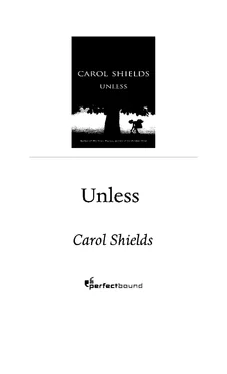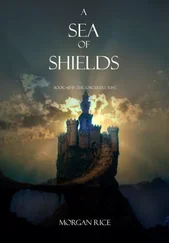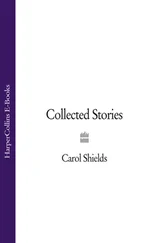Carol Shields - Unless
Здесь есть возможность читать онлайн «Carol Shields - Unless» — ознакомительный отрывок электронной книги совершенно бесплатно, а после прочтения отрывка купить полную версию. В некоторых случаях можно слушать аудио, скачать через торрент в формате fb2 и присутствует краткое содержание. Жанр: Современная проза, на английском языке. Описание произведения, (предисловие) а так же отзывы посетителей доступны на портале библиотеки ЛибКат.
- Название:Unless
- Автор:
- Жанр:
- Год:неизвестен
- ISBN:нет данных
- Рейтинг книги:4 / 5. Голосов: 1
-
Избранное:Добавить в избранное
- Отзывы:
-
Ваша оценка:
- 80
- 1
- 2
- 3
- 4
- 5
Unless: краткое содержание, описание и аннотация
Предлагаем к чтению аннотацию, описание, краткое содержание или предисловие (зависит от того, что написал сам автор книги «Unless»). Если вы не нашли необходимую информацию о книге — напишите в комментариях, мы постараемся отыскать её.
Unless — читать онлайн ознакомительный отрывок
Ниже представлен текст книги, разбитый по страницам. Система сохранения места последней прочитанной страницы, позволяет с удобством читать онлайн бесплатно книгу «Unless», без необходимости каждый раз заново искать на чём Вы остановились. Поставьте закладку, и сможете в любой момент перейти на страницу, на которой закончили чтение.
Интервал:
Закладка:
I enjoyed having company in the kitchen in the early morning. I loved her sleepy, yawning, mussed look, merging with what I thought of as the careless use of herself in the world — the untidy Bathurst apartment, Ben, the passion for Flaubert — all of which I would never understand completely because it was unhinged from my own frame of time, the sixties child, the nineties child. For the moment, though, she was home; I had her to myself. She was wearing one of my cast-off robes that zipped up the front, that awful burgundy colour, her body lending grace to the awkward lines. But I was suddenly alerted to something about her presence: the fact that her face looked oddly fallen. Her eyes were swollen, filled, though not with tears. What I glimpsed there was something hard, fixed, chitinous. What was it? “We are real only in our moments of recognition” — who said that? I was recognizing something now.
I put on my reading glasses and looked at my daughter again, closely. I made her turn toward the window so that the light fell across her eyes and on her hard little upper lip. She blinked at last, then closed her eyes against the light and against me.
“Is it Ben?”
“Partly.”
“You don’t love him the way you did.”
“I do. And I don’t. Don’t enough.”
“What do you mean, not enough?”
She shrugged and made a grab for my waistline, just hooked her thumb over the belt of my robe and hung on, with her forehead pressed into my stomach. I would give anything to have that moment back.
“Try to explain,” I said.
“I can’t love anyone enough.”
“Why not?”
“I love the world more.” She was sobbing now.
“What do you mean, the world?”
“All of it. Existence.”
“You mean,” I said, knowing this would sound stupid, “like mountains and oceans and trees and things?”
“All those things. But the other things too.”
I had eased myself into a chair and was massaging the tender place between her shoulder blades. My thumb fit there perfectly, doing its little circular motion. I had no way of knowing this would be her last visit home, that she was about to disappear. “Go on.”
“There’s literature,” she said. “And language. Well, you know. And branches of languages and dead languages and forgotten dead languages. And Matisse. And Hamlet. It’s all so big, and I love all of it.”
“But what —?”
“And whole continents. India. Especially those places like India that I’ve never seen.
Every little trail running off every hidden dirt road branching off from every major trade route. The shrubbery, the footpaths. The little town squares. There must be millions of town squares. I’ll never see them all, so what is the point?”
“You could spend a year travelling, you know, Norah.” I could hear Natalie and Christine moving about upstairs, shouting from bedroom to bedroom, tuning a radio to the local rock station.
“And the tides,” Norah said. “Think of the tides. They never forget to come and go. The earth tipping in space. Hardly anyone understands them.”
“Has Ben moved out?”
“No.”
“What, then?”
“I don’t know.”
“Where are you living?”
“I’m still there. For the time being. But I’m thinking about going on my own.”
“Your classes. Your spring courses. What about them?”
“What about them?”
“You’ve dropped out of university.” I couldn’t believe this thought that popped into my head so suddenly and had to say it again. “You’ve dropped out of university.”
“I’m thinking about it. About not taking my exams.”
“Why?”
“It’s just — you know — sort of pointless.”
“What about your scholarship?”
“I don’t need any money. That’s what’s so astonishing. I can give up my scholarship —”
“Does Ben know what you’re thinking of?”
“Moving out or not taking exams?”
“Both.”
“No.”
“You don’t intend to tell him.”
“No.”
“Will you talk to your father?”
“God, no.”
“Please, Norah. He went through some — some phases — when he was younger. Way back. Please talk to him.”
“No. I can’t.”
“Please, Norah.”
“All right.”
Injury, when it comes, arrives from so many different directions that I don’t even attempt to track it. News from Indonesia or Jerusalem, Bush heating up for the election, breakthrough advances in cancer research — none of this had anything to do with this beautiful first daughter of mine with her light, fine hair, who was good, who was clever, who spoke in a low musical voice unusual for her age, who was living obediently and reading Flaubert and provoking no one who might do her damage.
I felt the kitchen walls swell outward, everything curved as in a TV cartoon, and then shrink inward, pressing against the two of us. “You do realize this is serious,” I said to her.
“You are in a serious psychological state and you need help. It is very likely that you are depressed. It may be you have some mineral or vitamin deficiency, something as simple as that.”
“It’s not one big thing. I know that much. It’s a lot of little things. I’m trying to get past the little things, but I can’t.”
“Norah,” I tried. “The world often seems to be withholding something from us. We all feel that way at times, but especially at your age. You have to face up to it —”
“But that’s exactly what I want to do. I’m trying to face up to it. But it’s too big.”
“Has something happened, something you haven’t told us about?”
“No. It’s just — everything.”
I heard myself shouting into her face, making a rough knothole in the centre of the world, rude and out of control. “You have to talk to your father today,” I told her. “Today.”
“I said all right.”
“But you must talk to someone else as well. Someone in the counselling area. Today.”
Did I really say that: “in the counselling area”? No wonder she stared at me.
“It’s Sunday,” she said.
“We’ll go to the hospital. Emergency will be open.”
“It’s not an emergency.”
“Norah, you need help.”
“I’m trying to find where I fit in.”
She held on to me desperately then. I was thinking quickly. Drugs. Some awful mix-up with drugs. Or a cult. I tried to picture cult members I’d seen hanging around the university, grey robes, sandals. Or those awful born-again Christians who won’t let women wear makeup and cut off their hair if they talk back. I stared at Norah’s mouth: no lipstick. But, no, it was breakfast time; no one would be wearing makeup at this hour. Still, there had to be some perfectly logical explanation if I could just think my way through to it. Something had scrolled backward in her consciousness, giving her a naked naïveté about life, that it can be brought to a state of perfection, though we know this can never happen. Or maybe it was a temporary imbalance of the inner ear. I’d read about that recently. Mononucleosis, the old bugaboo, the particular enemy of students; people used to think it was passed around by kissing. Or maybe a brain tumour, massive but not inoperable. A misalignment in the spine, which would require the merest adjustment by an expert in Boston — we could fly down there in less than two hours, a breeze.
These were sensible ideas, examples of the kind of sideways thinking I’ve learned from Tom. My heartbeat, though, kept drilling straight through my calm speculations. I knew.
Right away I knew this was the beginning of sorrow. In fact, it must have been less than an hour later that Norah left the house, just slipped out the front door with her orange backpack, hitching a ride, probably, into Toronto. I couldn’t believe she left without saying goodbye. I looked all over the house for her and for her things. No one. Nothing. Then I knew how wildly out of control she was, how she’d become dangerous to her own being. She was lost.
Читать дальшеИнтервал:
Закладка:
Похожие книги на «Unless»
Представляем Вашему вниманию похожие книги на «Unless» списком для выбора. Мы отобрали схожую по названию и смыслу литературу в надежде предоставить читателям больше вариантов отыскать новые, интересные, ещё непрочитанные произведения.
Обсуждение, отзывы о книге «Unless» и просто собственные мнения читателей. Оставьте ваши комментарии, напишите, что Вы думаете о произведении, его смысле или главных героях. Укажите что конкретно понравилось, а что нет, и почему Вы так считаете.












